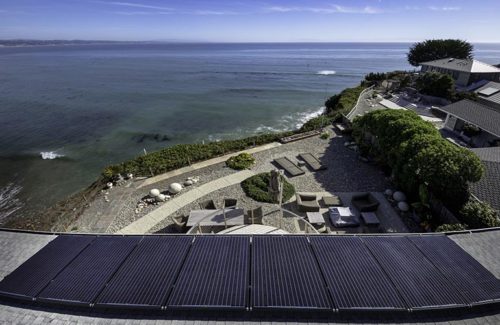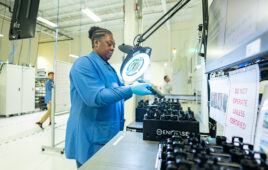Referrals are sales generated by word of mouth, often from former customers and through relationships developed with businesses in adjacent industries. Solar contractors, especially those working in regional residential markets, attribute a large stake of their sales to jobs well done.

Allterra Solar
“It’s all about customer experience. Nobody’s going to refer you if they didn’t have a good experience with you, so that’s first and foremost the most important thing,” said Heather Hodgkins, customer experience and marketing manager of Maine Solar Solutions.
With the prevalence of online ratings, a solar contractor’s reputation hinges on customer experience, from initial education to sale and installation.
Establishing and maintaining relationships
Referrals are not a day one means of sales. Solar contractors present and involved in their communities with some kilowatts under their belts are the ones who generate referrals, and it’s a company-wide effort, said Micah Breeden, CFO of Allterra Solar, a residential PV contractor based in Santa Cruz, California.
Allterra’s staff, including installers, designers and administrators, are taught the company’s offerings, including its referral program, to integrate into all conversations around solar.
“A big part of sales is trust and building that relationship, and if you get a referral from a customer to a friend or relative, that part of the equation’s already taken care of,” Breeden said. “They’re coming into it with a trust for the company starting off [that] you don’t have to work to build.”
Prior to the sale, trust is built by sitting down with a customer and explaining the installation process, local utility hookups, net-metering incentives and proper operation of the system. After installation is complete, the relationship is nurtured by checking in with customers periodically to ensure the system is meeting their needs and running correctly.
Solar installers who have successfully generated referral sales keep in contact with their customers. Even jobs that didn’t go 100% smoothly can result in referrals when handled the right way.
“We’ve gotten referrals from people [where] we’ve messed up on their jobs, and it’s just about how you handle the mistakes you made,” Breeden said. “You can make it right and make that customer happy. You went about it the right way, you owned the mistake and you resolved it, so they’re still happy and they’re still sending customers your way. It’s not like you have to be perfect.”
Additionally, referrals can come from cooperation and support of industries that complement solar, like roofing, HVAC, homebuilding and LED lighting.
“The key to those relationships for us is making sure that we’re providing value on both sides, that we can’t just expect people to go out and do our work for us,” said Lewis Butler, director of sales for Simpleray. “At the end of the day, if we see that our customers have a need and we can solve that need by recommending another subcontractor we trust, it helps our customers out, helps our third-party relationships out and then hopefully, they’ll help us out too.”
Simpleray of Fairfield, Iowa, specializes in industrial and commercial projects. While popularly used in residential sales, Simpleray has generated referrals from tightknit midwestern industries like hog and dairy farms. The company tries to let the solar arrays market themselves, whether through customer referrals or installing a television or kiosk to display system data inside the business.
“It goes both ways,” Butler said. “There’s nothing better than a good referral, there’s nothing worse than a bad referral because you can’t shake that.”
In smaller communities with high demand for solar, customers can shop around and compare contracts. Remaining attentive and coming well recommended can give a project proposal an edge, and, in some cases, customers will go straight to one solar contractor with a glowing referral.
Over time, efforts toward referral generation can reduce a company’s marketing costs. Customers and third-party businesses will end up doing the advertising themselves.
“Dollar per dollar, we’d rather pay our customers because they’re the best advocates,” Butler said. “They understand how it works, you can go see and touch it, you can get their electric bill. No Facebook ad, no LinkedIn post, none of that stuff is going to carry the same weight as the guy down the street who did it.”
Incentivizing referrals
Each company interviewed for this story has a cash incentive for people who refer a customer that results in a sale.
Simpleray has an in-house application that gives customers up-to-date information on their solar system, like generated kilowatt-hours, energy cost savings and environmental benefits. That app also includes the company’s referral program.
“That’s a way for our customers to funnel us referrals when they’re checking the app, so it’s one more touchpoint for us,” Butler said. “We try to encourage the sales reps to think of their commission not just as their commission; it’s the commission of anyone who helps them get that deal across the finish line.”
Maine Solar Solutions dabbled with an app but has found more success placing its referral program on the company’s website. Referrals are brought up in sales conversations, in marketing like email newsletters and system operation manuals left for customers after installation.
“Our sales team is not commission-based,” Hodgkins said. “They get a solid salary so they’re all very self-motivated to do a good job because they stand behind what they’re doing and they love educating people about solar. We don’t want a customer just to have a customer. We want a customer to love the technology, see the investment because that not only helps us as a business, but it just helps solar technology and the movement in general.”
As solar grows from a niche industry to mainstream, positive referrals from neighbors and friends can help spread the message that going solar is a real possibility for more and more Americans.





Nice article, I especially liked this point, “Solar installers who have successfully generated referral sales keep in contact with their customers. Even jobs that didn’t go 100% smoothly can result in referrals when handled the right way.”
The three provisions a solar company needs to generate satisfactory referral volume:
1) Provide an excellent solar customer experience that includes post-install engagement
2) Provide an appropriate incentive
3) Provide a simple mechanism to capture the referrals.
Totally agree – I think so many solar companies say GOODBYE to customers once the installation is finished. We do our best to continue supporting our customers long after installation – this usually always leads to referrals. Neighbors, family members, etc.